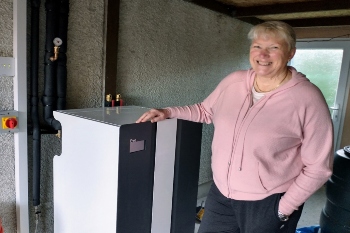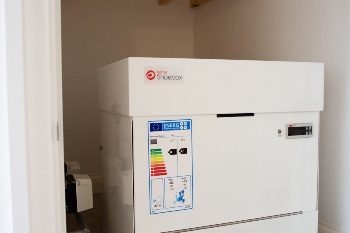
Heating is an essential part of our daily lives. We rely on it to cook, wash, and maintain comfort at home. In 2019, 17% of heating emissions from buildings came from homes; this is comparable to the contribution of all petrol and diesel cars. However, in stark contrast to the electrical vehicle market, we have not seen mass adoption of low carbon heating. This leaves our country with a steep hill to climb when it comes to decarbonisation of the 27 million existing households currently burning fossil fuels for heat. It’s time we acknowledged we aren’t going to reach our goal with the tools currently on offer.
Kensa Utilities, through the European Regional Development Fund supported project, Heat the Streets, are stepping up to the challenge by replicating the gas network with existing low carbon technology. Shared ground arrays, installed in the public realm, owned, and maintained by Kensa Utilities, collect heat from the ground and distribute it to homes. Each household pays a standing charge for use of the infrastructure in the ground and is responsible for the boiler (in this case a Kensa heat pump) in their house.
Households in Stithians, near the Kensa headquarters, have been eager to take part in this project which has both simplified heat decarbonisation and provided a new finance model that reduces the burden on the homeowner.
The project is now in full swing and is receiving nothing but positive feedback from the beneficiaries, Lowenna, who was one of the first to have her heating system replaced stated:
“We’ve put up with a poorly installed air source for 9 years, it’s good to have a system that works. Our water pressure has got a lot better; everything has improved, and we have heat in every room. When the air source is removed it will give me more space in the garden."
Jackie, another resident who has also received the heating system upgrade, said:
“I no longer need to have an LPG Tank as that was previously the source of gas that came into the house to heat a very old central heating system. What we now have is very smart, non-fossil fuel, very eco-friendly that runs how you want it to. So you don't have to have it either on or off, you can set it to whatever temperature you want and it makes life really comfortable."
|
|
The project will continue to install the infrastructure and heat pumps into mid-2023 and will soon begin its most ambitious phase installing the technology to its largest shared ground loop array connecting 60 homes of mixed ownership (private and social housing).
In their view, Kensa's vision of networked heat pumps offers a solution that is no different from a gas grid-based solution. The consumer owns a ground source heat pump in their home and pays a monthly charge to connect to the ambient temperature heat network. Kensa are calling this shared ownership, with Kensa Utilities owning and funding the underground infrastructure and the homeowner owning the heat pump inside their home. As demonstrated in Heat the Streets the shared ownership approach has been developed to support the rollout of networked heat pumps.
The shared ground loop array is unobtrusive, scalable, and perfectly suitable for domestic and non-domestic developments of all sizes, ranging from streets of houses to tower blocks of apartments. A shared borehole ground array can last for up to 100 years, so it is an attractive long-term investment opportunity private finance.
Compared to all other types of heating, including air source heat pumps, ground source heat pumps have the lowest carbon footprint, the lowest operating costs, and the lowest grid impact. Ground source heat pumps are powered by electricity, delivering 3 to 5 kW of renewable energy for every 1 kW of electricity consumed.
|
|
Due to air source heat pumps having their lowest efficiency when people need them the most, upgrading the national grid and installing sufficient generation capacity to serve the 85% of UK properties currently heated by natural gas would cost Britain dearly. With far higher efficiency in winter months due to the stability of the ground temperature, networked heat pumps offer the most cost-effective route to decarbonisation of heating available today.
With decades of experience designing, installing, and operating networked heat pump solutions at scale, Kensa has considered the practical implications of bringing this solution to the market.
According to a Whole Life - Whole Cost Benefit Analysis, networked heat pumps provide the lowest cost, lowest carbon decarbonisation pathway in dense urban areas. By using this model, the technology can be quickly adopted by entire streets.
Installing the underground infrastructure for ground source heat pumps a street at a time would enable communities to switch to renewable heating when ready. This would be a gradual transition, as was the case with the original gas grid rollout.
If your local authority has declared a climate emergency but is unsure how to tackle housing stock, you should contact Kensa Utilities to learn more about mass deployment of networked heat pumps.
The project is receiving up to £6.2 million of funding from the England European Regional Development Fund as part of the European Structural and Investment Funds Growth Programme 2014-2020. The Ministry of Housing, Communities and Local Government (and in London the intermediate body Greater London Authority) is the Managing Authority for European Regional Development Fund. Established by the European Union, the European Regional Development Fund helps local areas stimulate their economic development by investing in projects which will support innovation, businesses, create jobs and local community regenerations.
For more information visit https://www.gov.uk/european-growth-funding.


 Image: Stithians resident Jackie, with her newly installed Kensa Evo Heat Pump.
Image: Stithians resident Jackie, with her newly installed Kensa Evo Heat Pump. Image: A Kensa Shoebox heat pump installed in an airing cupboard.
Image: A Kensa Shoebox heat pump installed in an airing cupboard.










